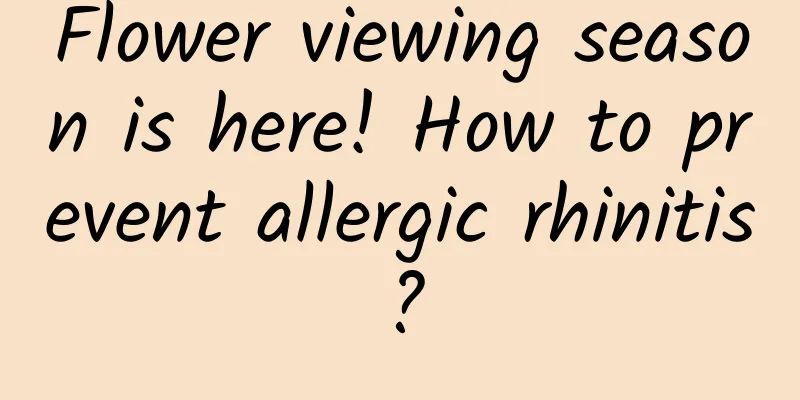Flower viewing season is here! How to prevent allergic rhinitis?

|
It’s the annual flower viewing season again. The circle of friends is indeed filled with the strong colors of spring. The blooming flowers bring us into this colorful spring. But it is worth noting that Behind such beautiful scenery is also the peak period for pollen allergies in adults and children. So how do you prevent pollen allergies in spring? Should patients with allergic rhinitis endure it or seek treatment? 01What is pollen allergy? Pollen allergy, also known as "seasonal allergic rhinitis", is a common disease in the allergy department. Pollen is generally about 30 to 50 microns in diameter and floats in the air. Since each pollen particle carries an antigenic determinant that can cause allergies, when it is inhaled into the respiratory tract, it will cause allergic reactions such as sneezing, runny nose, tears, and itching of the nose, eyes and external ear canal. In severe cases, it can also induce tracheitis, bronchial asthma and cor pulmonale, which must not be underestimated. 02How to distinguish pollen allergy from cold? Pollen allergy and cold do have similar symptoms, such as runny nose, sneezing, and nasal congestion, but there are three differences: 1. In terms of duration, a common viral cold, as long as there are no complications, generally takes about a week to recover. However, rhinitis caused by allergies, the condition recurs and generally lasts for 1 month. 2. Hay fever has a very special and iconic symptom, which is an itchy nose. Generally speaking, a cold may cause a runny nose, sneezing, and nasal congestion, but not an itchy nose. 3. In addition to the symptoms of the nose, colds also have systemic symptoms. Although fever may not be present, there is always some fatigue, tiredness, headache, dizziness, etc. However, the symptoms of pollen allergic rhinitis and conjunctivitis are limited to the nose and eyes. 03What is allergic rhinitis? Allergic rhinitis, also known as allergic rhinitis, is an IgE-mediated inflammatory reaction that occurs when the nasal mucosa comes into contact with allergens. Clinical symptoms include: nasal itching, paroxysmal and recurrent sneezing, watery nasal discharge and nasal congestion. It mainly affects children and the weak and immune-compromised elderly. 04Why do you get allergic rhinitis? Genetic allergic constitution. Babies with a family history of allergic diseases have a much higher incidence rate than normal babies, and are prone to allergic rhinitis. Babies with allergic constitutions often develop diseases such as urticaria and eczema that are related to allergic constitutions. Allergic rhinitis gradually develops during the continuous development, and the stimulation of allergens will trigger the onset of allergic rhinitis. Environmental factors. The cause of seasonal allergic rhinitis is the stimulation of allergens in the environment. Pollen, indoor dust, fungi, animal dander and feathers, house dust mites, etc. are all allergens of allergic rhinitis. As the degree of air pollution increases, babies who were not originally allergic may also develop allergic constitutions because their body immunity has not yet been fully formed, which brings a lot of troubles to babies and accelerates the occurrence of allergic inflammatory reactions in babies. 05Should allergic rhinitis be treated? If the symptoms of allergic rhinitis last for more than 3 days, it is generally recommended to take medication to relieve the symptoms, and it can effectively prevent the development and aggravation of asthma and other problems. If the allergic symptoms disappear but continue to recur, appropriate treatment should be used to relieve the symptoms. If allergic rhinitis is not effectively treated, it can cause the following complications: bronchial asthma, allergic sinusitis, allergic pharyngitis, secretory otitis media, etc. Therefore, allergic rhinitis needs to be treated in time to prevent the occurrence of complications. 06How to protect yourself during allergy season? 1. The key to allergic rhinitis is to reverse the allergic constitution, seek the help of professional doctors, regulate the immune system, and reduce allergic reactions. Change the allergic constitution, correct the wrong immune response, prevent the occurrence of allergies and reduce the recurrence of allergic rhinitis. 2. Wash your nose with saline. Use normal saline (concentration of 0.9%) to clean your nasal cavity, which can moisten the nasal mucosa, prevent and relieve allergic rhinitis, asthma, etc. 3. Since it is an allergy, you must stay away from allergens. First of all, we should observe what we are allergic to in our daily lives, such as common outdoor pollen, indoor dust, animal fur, and dander. After clarifying it, we should pay attention to avoid contact in our daily lives. In addition, we should pay attention to keeping the house clean and hygienic, clean the sheets and quilts regularly to remove dust mites; wearing a mask when going out can also isolate allergens and play a better protective role. It is recommended that friends who have allergic rhinitis should take it seriously, actively stay away from allergens, strengthen physical exercise, eat a reasonable diet, strengthen their physical fitness, seek medical treatment in time, and receive timely treatment! |
<<: Trust me, 20 minutes is enough.
Recommend
Revealed! The truth about voluntary blood donation
Follow "Body Code Decoding Bureau" (pub...
The difference between ovulation bleeding and menstruation
Many people know that menstrual bleeding occurs, ...
What are the benefits of moxibustion for women?
This moxibustion therapy can bring many benefits ...
How many days does it take for the Chinese medicine to work?
For postpartum women, insufficient milk secretion...
Why do blisters grow on the vulva?
The vulva is very important to women's bodies...
Can lambs drink rice soup? What should I do if lambs don’t eat after giving birth?
Sheep are mammals and are also the most common do...
Can you eat loquat when you have a cold? What are the benefits of loquat?
As we mentioned earlier, loquats are rich in vitam...
Women always feel the urge to urinate and have back pain
It is quite common for women to always feel back ...
What should I pay attention to when I have uterine cold?
Many people only realize the importance of daily ...
Doctors at Peking Union Medical College said: Visible pain means more accurate treatment! - Visualized ultrasound technology makes pain invisible
Author: Cui Xulei, deputy chief physician of Peki...
Invasive ductal breast carcinoma grade 2
We often see patients with invasive ductal carcin...
Why does my abdomen hurt in the afternoon after taking a medical abortion?
Some side effects may occur after medical abortio...
Yaowa Quiz | Is it better to take calcium tablets before meals?
The ingredients of calcium tablets are divided in...
[Medical Q&A] Why do some lung cancer patients need PET-CT?
Planner: Chinese Medical Association Reviewer: Zh...
Causes of menstrual bleeding
We know that menstruation is of great significanc...









